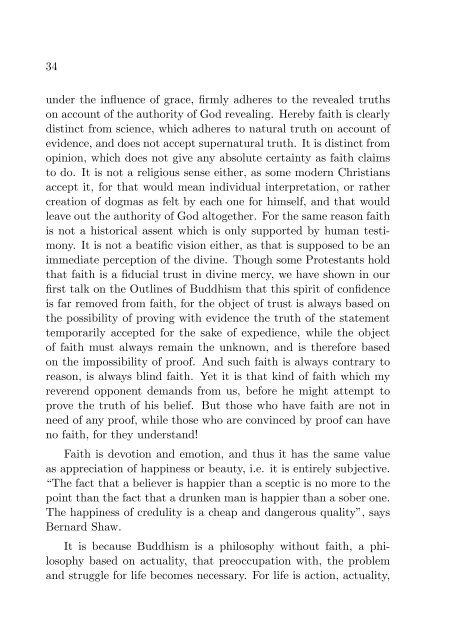Towards the Truth
Notes from a three-day debate in the 1940’s about Buddhism and Christianity.
Notes from a three-day debate in the 1940’s about Buddhism and Christianity.
You also want an ePaper? Increase the reach of your titles
YUMPU automatically turns print PDFs into web optimized ePapers that Google loves.
34<br />
under <strong>the</strong> influence of grace, firmly adheres to <strong>the</strong> revealed truths<br />
on account of <strong>the</strong> authority of God revealing. Hereby faith is clearly<br />
distinct from science, which adheres to natural truth on account of<br />
evidence, and does not accept supernatural truth. It is distinct from<br />
opinion, which does not give any absolute certainty as faith claims<br />
to do. It is not a religious sense ei<strong>the</strong>r, as some modern Christians<br />
accept it, for that would mean individual interpretation, or ra<strong>the</strong>r<br />
creation of dogmas as felt by each one for himself, and that would<br />
leave out <strong>the</strong> authority of God altoge<strong>the</strong>r. For <strong>the</strong> same reason faith<br />
is not a historical assent which is only supported by human testimony.<br />
It is not a beatific vision ei<strong>the</strong>r, as that is supposed to be an<br />
immediate perception of <strong>the</strong> divine. Though some Protestants hold<br />
that faith is a fiducial trust in divine mercy, we have shown in our<br />
first talk on <strong>the</strong> Outlines of Buddhism that this spirit of confidence<br />
is far removed from faith, for <strong>the</strong> object of trust is always based on<br />
<strong>the</strong> possibility of proving with evidence <strong>the</strong> truth of <strong>the</strong> statement<br />
temporarily accepted for <strong>the</strong> sake of expedience, while <strong>the</strong> object<br />
of faith must always remain <strong>the</strong> unknown, and is <strong>the</strong>refore based<br />
on <strong>the</strong> impossibility of proof. And such faith is always contrary to<br />
reason, is always blind faith. Yet it is that kind of faith which my<br />
reverend opponent demands from us, before he might attempt to<br />
prove <strong>the</strong> truth of his belief. But those who have faith are not in<br />
need of any proof, while those who are convinced by proof can have<br />
no faith, for <strong>the</strong>y understand!<br />
Faith is devotion and emotion, and thus it has <strong>the</strong> same value<br />
as appreciation of happiness or beauty, i.e. it is entirely subjective.<br />
“The fact that a believer is happier than a sceptic is no more to <strong>the</strong><br />
point than <strong>the</strong> fact that a drunken man is happier than a sober one.<br />
The happiness of credulity is a cheap and dangerous quality”, says<br />
Bernard Shaw.<br />
It is because Buddhism is a philosophy without faith, a philosophy<br />
based on actuality, that preoccupation with, <strong>the</strong> problem<br />
and struggle for life becomes necessary. For life is action, actuality,
















